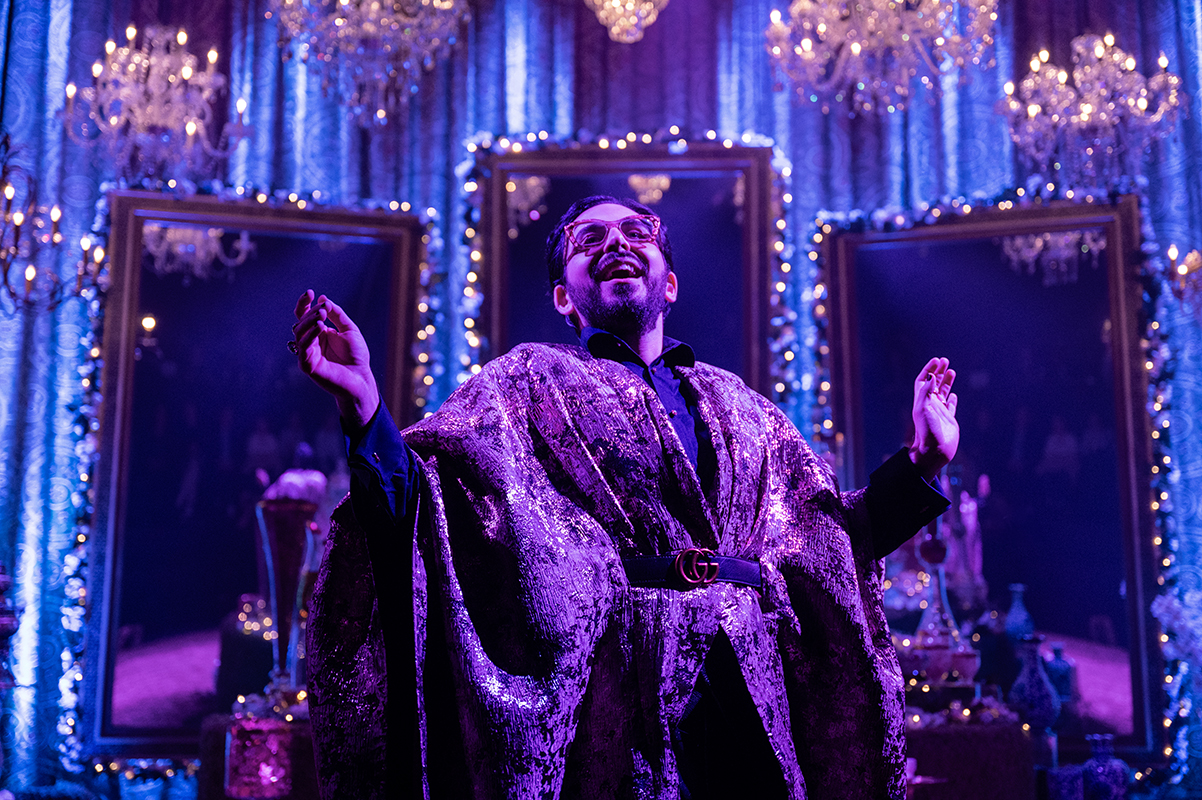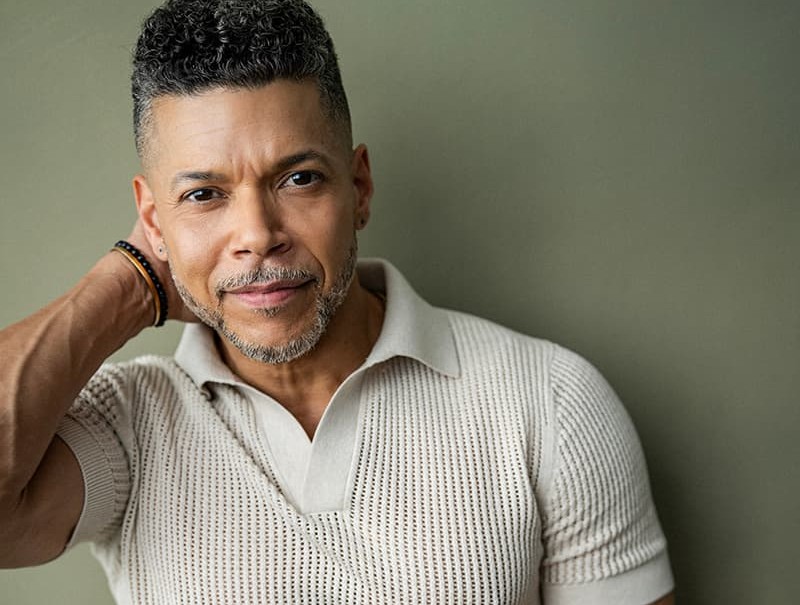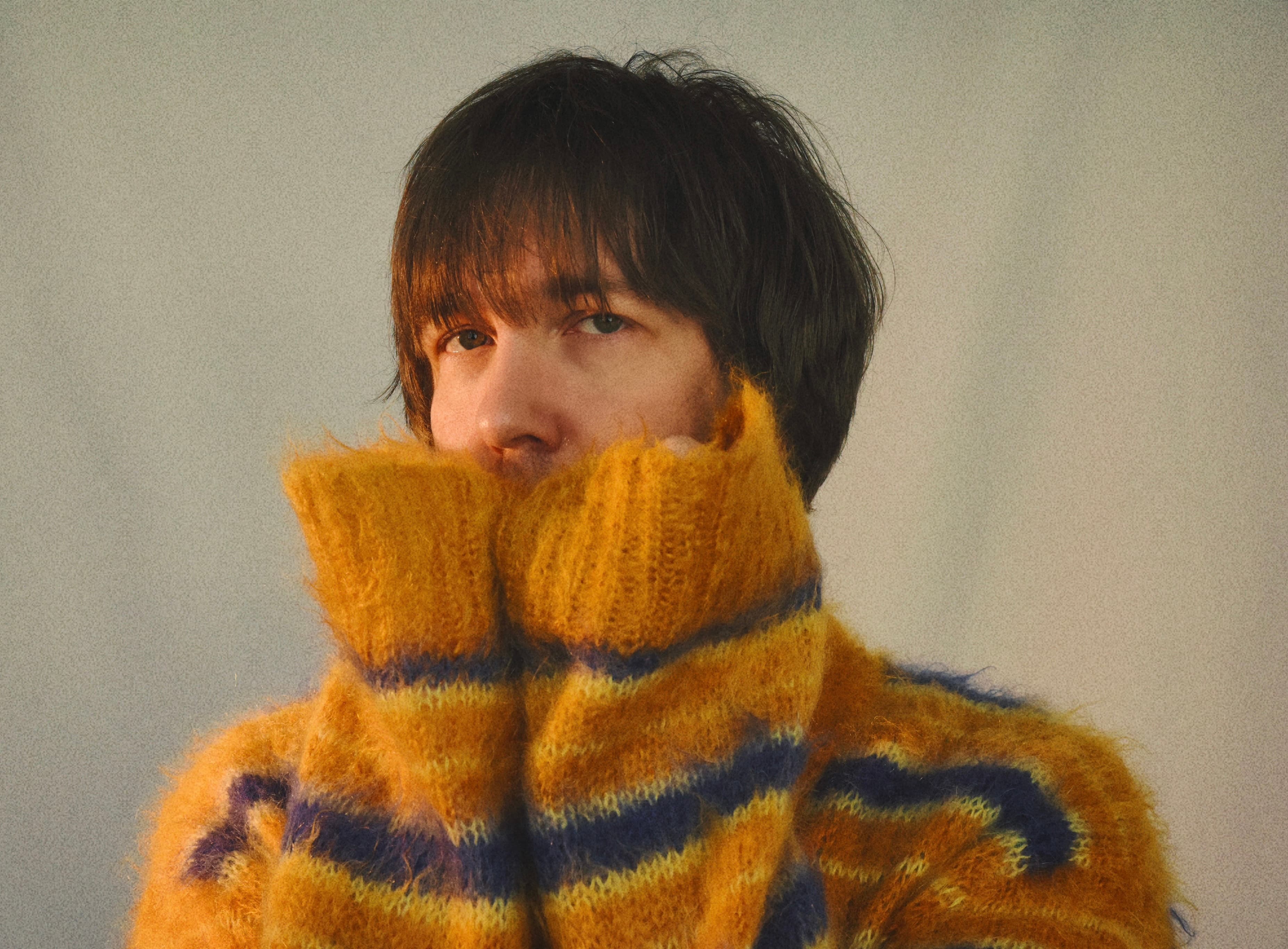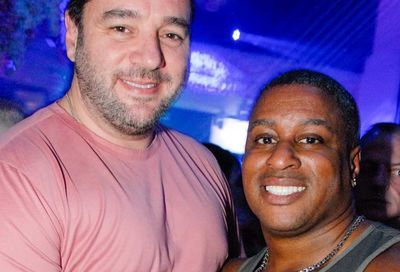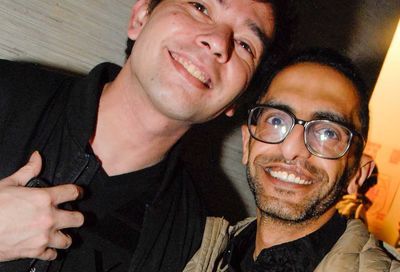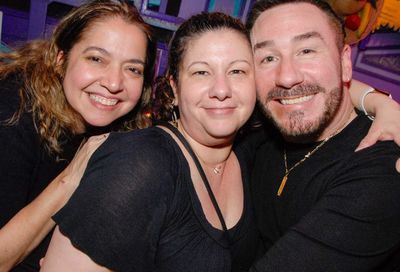Pop Superstar Adam Lambert Lives for High Drama
The pop star opens up about his soaring new album 'High Drama,' performing with Queen, and his pandemic-born original musical.

Here’s the thing with Adam Lambert. Most of the time when he reveals he’s signed on to do something professionally, it’s met with a raised eyebrow, a tilted head, and a question.
“He’s doing what?”
“Is he really right for that?”
“Can he make that work?”
These are the types of comments and queries that appear in articles, on social media, and in conversations whenever something new arrives or when he announces he’s going to take on a new project. Everything seems like a stretch. Or perhaps an odd choice.
But here’s the other thing about Adam Lambert — he always makes it work.
Following his time on American Idol, Lambert went from singing soaring ballads to hard electro-pop bangers, presenting his music to the world as a man who wears makeup and dances suggestively with other men on stage. A risk, but one that has cemented his status as an icon in the LGBTQ community and a powerhouse performer.
More than a decade ago, classic rock fans and even those who stick to contemporary pop were surprised to hear he’d agreed to perform with the legendary band Queen. Not everyone was thrilled with the collaboration. Now, he tours the world with them regularly, and he even charted a No. 1 album with the outfit in their home country of the U.K. as Queen + Adam Lambert.
He also just recently saw his first proper movie — the Sofia Coppola-produced Fairyland — premiere to positive reviews at Sundance. The question about whether Lambert is really an actor or not dissolves after realizing that every single thing he does is dramatic and theatrical, from his styling to his live performances to the songs he chooses to sing.
During this interview, he revealed that he’s hard at work on a musical situated in 1970s New York City. Again, something out of the ordinary for the reality show runner-up, but one that makes complete sense with who he is and the body of work he’s put out into the world.
Perhaps the most surprising announcement he’s made in recent memory is that he has recorded an album of covers.
Titled High Drama, the set finds Lambert taking on a mix of classics and lesser-known titles from a variety of genres and time periods. A complete collection of reworkings is nothing new for a musician, and once again, it seemed an odd choice for someone so talented. But, as always, after one listen through, it becomes clear that while it might not be a route that works for everyone, this Grammy nominee slays it.
Lambert possesses one of the most distinctive and impressive voices in the music industry today, and he employs it brilliantly across High Drama. He introduces a new generation to the quietly queer “Mad About the Boy” by Noël Coward, switches pronouns to make Sia’s “Chandelier” work authentically for him, and delivers a showstopping performance of “Holding Out for a Hero,” which he calls a “camp guilty pleasure.”
High Drama is loud, dramatic, over-the-top, and highly enjoyable. Ultimately, it shows that once again, whatever Lambert does, he’s going to do well, and anyone who doubts him will soon be proven wrong.

METRO WEEKLY: Congrats on the album, I loved all of it, and there are certain songs where I thought, “Well this is Adam’s song.”
ADAM LAMBERT: Thank you. That’s sweet. I don’t see the point of putting out an album of covers where you’re just copying the original. So the challenge was how do we get in the studio and make them new? That was a fun challenge for me.
MW: What made you decide to go this route to begin with?
LAMBERT: Well, I’m working on some other stuff right now. I’m working on another project that has a longer timeline — it’s a musical, actually.
MW: We’ll get into that later.
LAMBERT: We can get into it later. It just takes a lot longer, and there’s more pieces to it. And I’ve been working on that since the pandemic started, so I just really wanted to put something out. I wanted to give some music to the fans and I wanted some stuff to sing.
I got such an amazing response from that Cher “Believe” performance I did at the Kennedy Centre Honors, and I’ve gotten praise in the past for re-inventing songs on Idol. I thought, “Let’s do an album of covers, that’d be fun.” It’s a lot quicker of a process because the songs are already written, so that’s a bit of a shortcut. We literally did it in two months.
MW: When I first heard about this, I was, to be honest, a little surprised because I remember you saying “I’m not interested in a covers album,” sometime in the past. So what changed?
LAMBERT: That’s so funny to me. Something came up the other day where [someone was] like, “Oh, you said this in 2016,” and I’m like, “Can I not change my mind?” It’s a timing thing. I think at that moment in time I just didn’t feel like that’s what I wanted to do, and at this moment in time it’s what I want to do. Pretty simple.
As you get a bit more mature as an artist, I think there are certain projects that are about you, and there are certain projects where you really wanna put something out for your fans. Entertainment is all about the audience, so I wanted to do something that people could easily grab on to. And covers are great because if you know the song already, it makes you appreciate what the artist is doing even more.
MW: Tell me about the process of selecting the songs?
LAMBERT: It was a long list. We had a lot to choose from. The label and my team had some suggestions that were great, and then I started whittling down the list. The criteria was if it’s something that I can relate to from my life experience. Can I get behind the story that we’re telling? Also the criteria was like, can I really flip this and make it something different? And then thirdly, is it a good melody? Do I want to sing it? Will it be good for my voice? We came up with the album title as we were talking about the approach and the idea was songs that fit the theme of high drama, the theatrics, over the top camp…
I’m not known for being subtle. I know that my brand is larger than life. I like to be theatrical and over the top. I like loud, weird fashion. I like wearing makeup. That’s my vibe.
The last album that I put out — Velvet — was really an amazing experience because it allowed me to explore, in-depth, a lot of different musical impulses. Because it was an independent release, I was in the driver’s seat more than I’ve ever been. I learned a lot in the studio with the producers that I worked with about mixing and all that. I’m like, okay. So how do I take these songs and make them me? Doing that last album and being where I’m at in my life, I think I’m more clear on my identity and my brand as both a performer and as a person, and I wanted all the songs to feel authentic as much as possible, and I think we did it. I’m really proud of it.
MW: When I saw the title, I was like, “Oh, that’s fun!” And after listening through, I agree that these were high drama.
LAMBERT: It’s a little on the nose. I was talking to the head of the label in the U.K., and I was explaining, “Yeah, I just wanna make them all very high drama,” and he goes, “Well, there is your album title,” and I’m like, “Yeah. That’s it.”

MW: That was easy. I love that these are all covers but they span genres and decades. We’ve got Kings of Leon, which is… I want to say not that long ago, but actually, I guess it’s a couple of years back now. And then the ’80s and more. So what’s the throughline with these tracks, other than the fact that you can bring drama to them?
LAMBERT: I mean, there really isn’t. I think most of the artists that I’m drawn to are a little more alternative or rock. I wanted the album to feel like a rockstar fantasy. Again, knowing more than ever what my specific angle is helps, but it was really just “What’s a good song?”
I knew I wanted it to be diverse. As far as when it was written, and what genres they were, I wanted to surprise people a little bit with some of the choices. I always like doing that. Also sort of the audacity to do something like “Holding Out for a Hero,” which is a kind of camp guilty pleasure, can I turn this into something that I feel is cool?
MW: “Holding Out for a Hero,” by the way, is my favorite on the album. It is the one where I thought, “Adam does a better version of this song than the original.”
LAMBERT: Yeah, I just love that song. And then when you tell somebody, “I’m gonna do this one,” they give you a look. Then the best feeling is when they finally hear it and they go, “Oh, okay. That’s fun.”
MW: So when you’re doing covers, I imagine it’s got to be tough because there are people who love the original and that’s what they want to hear. Then there are people who want to hear Adam Lambert and is it enough of what we know from him. How do you balance that when you’re creating?
LAMBERT: Well, I’ve had a lot of practice doing the Queen gig for the past decade. Obviously, we’re doing the same arrangements of the songs, but it’s a different singer. I’ve encountered plenty of resistance, but I’ve also encountered just as much, if not more, praise and excitement. It doesn’t scare me anymore. Do you know what I mean?
I think one thing that I’ve learned about performing as I’ve gotten a little older and with more experience is that less can be more sometimes, even on an album called High Drama. You don’t have to change the melody. Stick to what worked in the beginning, and so much of [the reason] why I picked these songs is because the stories they were telling were so wonderful. The lyrics on all of these songs are just so yummy, and I think staying true to the intention of the song is really important.
Also that authenticity thing — making them come from a real place. I think people will know the difference if it’s put on or if it’s real, and all of the songs in this album are from things that I’ve lived. I feel like they’re coming from something true. Even the way they sound is coming from something true.
When we did the “Sex on Fire” arrangement, that was another one where I was like, I don’t know if I should touch the original because the original is so good. It reminded me of a time in the mid to late 2000s, when I was in my 20s. Lots of music discovery… I was going to new events and meeting new people. I remember going to Burning Man and Coachella for the first time, and that idea of that festival spirit, that feeling of being outside with your friends in a euphoric, possibly psychedelic state. And all the music from that time period, there was so much of that indie-dance thing going on. I loved that time period of music, not only because I loved the music, but what it was running parallel to in my own life. So that’s where I wanted to put “Sex on Fire.” I wanted it to come from that sound. That feeling of a lot of firsts.

MW: When you describe that sound I go to MGMT.
LAMBERT: One hundred percent. And that was one of our references. Tommy English, his team, and I, we started naming all these groups from that period and how much we love them — Hot Chip and LCD Soundsystem — so they were part of the sounds we were looking for.
Just to put a curveball on it, we came up with the groove for the verse, and then I was like, I don’t wanna sing this like the original… What else can I find with it? It was so rhythmic, that baseline. I was like, just like for the hell of it, I’m going to sing it like Prince, and it just kind of gelled and felt like something interesting, so we went with it.
MW: You said you started with this big list. Were there artists or songs that you wanted that you didn’t think could work, or maybe you started to work on it and realized it wasn’t a fit?
LAMBERT: There was no actual recording that didn’t make the album. We planned it really carefully, so we didn’t waste time or money. I think there are a few on the list that could work that we felt we’ll get to another time. There’s plenty more where that came from, I’ll put it that way.
MW: Well, I am ready for High Drama, part two. Listening through, it’s interesting that you chose songs that originally used male pronouns, like “Mad About The Boy,” and then there are others where you changed it a little bit, like “Chandelier.” We’re in an era where people are listening carefully for pronouns in music. Do they matter to you at all?
LAMBERT: When I picked the songs, I wasn’t really thinking about that, to be totally honest, but it was something that I realized as I was doing it. It was almost nice that I didn’t think about it because it’s so natural to be able to sing about a man in all these songs in a way that years ago would have been a bit tricky to navigate or taboo.
On my first album, there were songs that were written where we had to change the pronouns because the radio guys wouldn’t touch it. Our community, we pay attention to that stuff, as we should. I know there was a lot of conversation about it years ago, and applauding the artists that used the male pronouns. You can do that now. But there were so many gatekeepers when I started that it was one of those things where you have to sort of either play the game or be a martyr and kind of have no chance. It was tricky, but I’m glad that that’s shifted.
The whole industry’s changed. The queer representation right now is the best it’s ever been. I know we have a lot more work to do, but man…. Like with the Grammys, there’s so much representation. I was so proud of Sam [Smith] and Kim [Petras] and Steve Lacy and Brandi Carlile. It was a gay-ass Grammys.
MW: It was a very gay Grammys.
LAMBERT: And Dijon was all over Beyoncé’s Renaissance album, which was amazing. That album is like putting sound bites in from queer history, and it was a really lovely love letter to our community. It’s exciting, because like I said, when I started, it was such a different landscape, and to see the progress that’s been made — like, all the stuff that Lil Nas X has been doing, which is so fabulous and hilarious, and Sam’s trajectory is amazing and Kim. It’s really, really exciting to see the progress.
MW: You’re a big part of that change, just being who you are. I remember growing up and watching your live performances with kissing men.
LAMBERT: I think I was an example of people not actually being ready for it, so timing is everything. I definitely gave it a shot. I hope that I helped create some extra conversation around it, because there was definitely a huge double standard. There were things that straight performers had been doing forever, there was stuff that women could get away with that men couldn’t. I realized really quickly, like, I don’t know if I’m willing to kiss my whole career goodbye here, so I do have to at some point, play the game, but I’m gonna toe the line and make sure that I’m vocal about it and that I bring things up and that I’m not afraid or ashamed. I’m not going back down, I’m not gonna do that. I’ll sidewind a little bit for my own good, but I’ve always really been about standing up for this cause and being a voice. I think it’s important.
MW: Absolutely. Now, this is a tough question. Is there a favorite on the album?
LAMBERT: Oh, not really. I love all of them. I really love the way that “I Can’t Stand the Rain” turned out. The groove is really cool. [I liked] being part of the process from the ground up and being in the studio and not exactly knowing what I want a track to sound like, and it’s slowly sort of organically becoming something. It is such a fun thing to be a part of.
MW: You’ve been with Queen now for a decade plus. How does it feel to have had this incredible job for that long? Most people don’t have any job that long.
LAMBERT: It’s a fucking honor. The fact that they wanted me to perform with them was a huge compliment in the beginning, and obviously still is. I remember when they asked me, I was like, “Yes, of course, I would never pass up something like this!” But I was instantly nervous about it, knowing the legacy that they have and how amazing Freddie Mercury was and knowing that their fans were probably going to be protective of that legacy. I was very aware. Sometimes I wish I was dumb, because ignorance can be bliss. Sometimes I wish I just didn’t pay attention or I was in denial. But I do pay attention and I am very hard on myself. I am my own worst enemy. Some things like that can slow you down or can cripple you a little bit.
The first gig we did, I was so nervous, and I can say now looking back that it evolved over time. The first handful of shows I did with them, I was doing a lot of showing off, trying to prove that I deserved to be there. Like, look what I can do with my voice! We did a great job and those shows were fabulous, but looking back on it now….
I love where I’m at now with them because I feel more confident and comfortable in the position, and I don’t feel like I have to prove as much. I don’t feel like I’m looking for the same amount of validation. I feel like I have faith in the power of the songs. Also I have a belief in myself that I can pull it off.
MW: When you’re performing with Queen, I bet there are people there who want hear Queen + Adam Lambert, there are people there who want to hear Freddie Mercury, and there are people who want to hear you do Freddie Mercury. So how do you balance that?
LAMBERT: Well, from the get-go, when they asked me to do it, I had a conversation with Brian [May] and Roger [Taylor], the guitarist and the drummer. “What are you guys looking for,” and they’re like, “We don’t want you to imitate him. We don’t want an impersonation and we don’t want an imitation. We want you to do your thing with it.”
I love the original so much, and the records that we all know, and Brian and Roger being on stage, they’re the band, they’re the ones who wrote these songs, they’re the ones who were there from the beginning. I follow their lead more than anything, because I want them to feel they are in control of this.
Everything sort of gets reworked, but finding that balance between me and Freddie came down to stopping listening to the recordings. I don’t want to listen to the records anymore because I’ll just naturally end up mimicking him.
I started looking at the songs as compositions. I would get an accompaniment, an instrumental, and look at the words and be like, what’s the story? What’s the emotion that this is meant to convey? What’s the feeling that we want the audience to feel with this song?
I started focusing on it from that like an intention-based thing, and that’s how I found the balance. If the intention is in-line with the original spirit of the song, that’s what I do. I don’t mimic his voice, but Freddie’s impulses, his instincts on what to do with certain parts of the song, I took that as direction.
MW: I’m impressed with how you can manage to do as much touring with them as you do, perform live as Adam Lambert, and have this album. You work on a million other things. How do you make it work?
LAMBERT: By nature, I’m actually a lazy fuck, to be totally honest. I have an amazing manager who’s a workaholic and she’s very driven, and she pushes me where I need pushing. But I do have a lot of ideas. I have things that I want to try, things I want to do. And I’m glad that I have the help to juggle it all. And the touring is not year-round. We do a tour six, seven weeks tops, and maybe one a year, and there’s certain years we didn’t do it, so there’s plenty of time to do other shit.
MW: I saw you the other night at a private party and you’re still delivering the vocals. I imagine you have to think about your vocal cords and their health, and spacing it out. How do you manage that?
LAMBERT: I try not to focus on it too much, to be honest. I think when you hyper-focus on things they become bigger problems. It’s all intention-based. I’m getting on stage. My goal here is to entertain these people, and just trust your body to do the rest. That’s how you get there.
And that’s the thing about being a performer. You do a gig where the sound system might be kind of shit or there’s technical stuff that comes up. And you just have to just shrug it off a little bit, because if you get hung up on it then it ruins your time, and if you’re not having fun or you’re not locked into the emotion of a song, then you’re cheating the audience, and that’s the last thing I want.
MW: I noticed as I was researching for this interview that acting seems to have become a new focus for you.
LAMBERT: I started with musical theater way before Idol. I’ve always been an actor. And a lot of my approach to a lot of my music is sort of… Again, it’s intention-based. What’s the story? It all comes back to acting in a way. When I first moved to L.A. when I was like 19, I got an agent and I was auditioning, trying to do the whole TV/film thing, and I wasn’t booking anything.
I can say now that I wasn’t a good actor then, because I was way too in my head. I was way too self-conscious. I was uncomfortable in my own skin in many ways as a young man, and also all the parts that I was auditioning for were these straight cliche bro jobs. I was like, I don’t know what to do with this!
So getting back into it now is exciting because there’s so many more queer stories being told and queer characters to be played, and much more open-mindedness of “What’s a man? What’s masculinity?” All these things have shifted on the outside. And then also with me, I’m way more comfortable in my skin, so those things combine, and I find it really fun now. It’s not scary anymore.
MW: Are you specifically looking for queer stories and characters?
LAMBERT: Not specifically, no. I just think it’s exciting to be able to play them. It’s exciting that there are opportunities there — and, let’s be honest, I’m a famous gay person. So a lot of the things that I’ve been put forward for or been asked to be a part of, it has to do with that, and that’s great. I’m into that.
MW: You don’t at all find that limiting?
LAMBERT: I’m not only doing that. It’s the opportunities. It’s a direct line. I spent so many years before I was a recording artist playing other people, and they were always straight guys, and that was fine too, but it’s exciting that there’s more interesting characters to explore. I am not saying straight people aren’t interesting. I was insecure playing a straight guy, whereas now I don’t think I would care. It’s not really about that, it’s about the character.
MW: Fairyland premiered at Sundance. Were you there for that?
LAMBERT: Yeah, I was. It was really fun.
MW: Can we call it your first movie?
LAMBERT: It is. I was in Bohemian Rhapsody for a few frames, but this is my first real role.

MW: Were you nervous?
LAMBERT: No, actually. And I thought about it, I’m like, why am I not more nervous? But I felt really comfortable with the character and the material. It felt really natural to me. I have a handful of scenes. It’s not a huge part, but I knew who he was. I felt like I got who that guy is. I was a little apprehensive the morning I got there [for the first day of the shoot], but then the minute I met my two co-stars in those scenes, I was immediately really comfortable. They were really cool. And the dude who plays Steve, Scoot McNairy — I play his boyfriend — he’s so nice, so down to earth, which made me comfortable right away, and Emilia Jones, who plays the daughter, I love her. She’s great.
MW: How was it working with Sofia Coppola?
LAMBERT: She produced the movie. She wasn’t there on set, but I did get to hang with her at Sundance, which was amazing. She’s a class act.
MW: Do you know what’s next for the movie?
LAMBERT: Last I heard there was sort of a bidding war going on, so there’s definitely distribution on the horizon. I’m excited for people to see the movie. It’s a really good story. It’s hard to create anything new, obviously, but the combination of the parts of this story and the themes of it are something that I hadn’t seen before.
It’s [about a] single father who’s gay, raising his daughter in the ’70s in San Francisco amidst the backdrop of gay liberation, moving into the AIDS crisis. He has his little girl with his wife, [who] dies tragically in a car accident. They move to San Francisco and he’s sort of out. And when the daughter is old enough to try to understand it and ask questions, he eventually says to her, “Well, your mom knew that I was with men, but I also loved your mother, and I was trying to do what I was supposed to do in that time period, in the late ’60s. I was being a man, I was getting married, having kids. That was what was expected.”
The other cool thing about it is any of these movies that explore the impact of the AIDS crisis and what it was actually like, I think a lot of us, since we weren’t there, we don’t realize how insane it was, the tragedy of losing so many friends and feeling so helpless with the government not stepping in and helping. It’s a story that needs to keep being told. People need to know what our history is.
I cried. I sobbed. It’s a sweet story.
MW: What’s next acting-wise? Do you have anything coming up? And what would you like to do?
LAMBERT: I’ve been stepping into voice-over work, which is really fun. I did a Netflix series called A Tale Dark and Grimm where I played the devil. It was a blast. I don’t think I’m supposed to talk about it yet, but I’m playing the villain in another series coming up for DreamWorks. I’m very excited about that. I just finished my last day of recording. It’s funny.
MW: What would be the dream role?
LAMBERT: I’m not sure. I’d love to do a movie musical. I think that would be really fun. I’ve always loved that. Maybe it hasn’t been written yet.
MW: What a great segue to the musical you’re writing that you mentioned earlier.
LAMBERT: The thing with the musical is that at this point, I don’t really think that I’m planning on being in it. Creating it is really nice. I’m always going to perform, I’m always going to sing, but I’m also really starting to get more and more interested in just being a part of a creative project. I’m an idea guy. I bring a lot of ideas to the table, and I love working with a team throwing stuff at the walls, playing with what sticks, being part of the process, problem-solving. I love all that. I will be putting out a concept album of the music, so that’ll be my contribution, that I will be presenting the songs to everybody, and then it’ll be adapted.
MW: Can you discuss what it is and what it sounds like?
LAMBERT: I’m not ready to give the whole thing away, but I can tell you it’s based on a true story. It takes place in the 1970s in New York, and the music is a love letter to that decade, so it jumps genres a lot. It’s also a very queer story, so it’ll be something that I think will resonate with a lot of people. I think it’ll resonate with people that were around then — older people that were in the ’70s — and it will also resonate, I think quite strongly, with young people as well.
MW: You said you started this during the pandemic?
LAMBERT: Yeah. I put out Velvet and literally that week, everything got canceled. My tour plans got canceled, my promotional plans got canceled. It cut its life short. And when I slowly realized what was happening, it was really sad. I was depressed for a minute. I put a lot of work and effort into that. And it’s still a good album, but I wish I could have shared it more and pushed it.
But the minute that settled, I needed something creative to do while I was sitting around the house. So I started the process with other producers and songwriters doing Zoom sessions. Not quite the same as sitting in the room with people, but you can still write good music, so we did.
MW: You mentioned it’s New York City in the ’70s. Was that inspired by Velvet? Because that makes me think a bit of Velvet.
LAMBERT: That era and that vibe is something that I personally love. I just love that throwback retro thing. I’ve always loved it. Queen is retro. I think the ’70s are the golden age of music.
When you think about it, so much of the music [that] came in at that time was new. Genres were invented at that time. There’s all these classic, iconic songs from that decade that we hear now. There’s so many artists referencing them even now.
MW: In addition to everything we’ve discussed, in the past few years you have done some TV hosting judging-type things, which is interesting, because that’s where your career began.
LAMBERT: It is full circle. It’s fun to get up there — and I have a lot of opinions, so I like to voice them. Years ago I did The X Factor down in Australia as a judge. And now I’m doing this show called Starstruck in the U.K. We just finished our second season. It should be airing any week now. Waiting on the panel, which was really fun.
It’s lower stakes than some of the other talent shows because it’s not about somebody trying to get a record deal to start their career. It’s more just like people get dressed up as their favorite icon and sing as them. It’s like an impersonation show, and it’s a good time.
MW: Having been on the other side of it, getting critiques and knowing you have to perform for certain people and all that, has that made you a kinder judge? Has that made you more critical?
LAMBERT: Because these aren’t people that are sitting there going, “I want a career in the recording industry,” it’s more of a game. It’s more of a party. It takes a lot of the weight out of the judgment. It’s not like, “You don’t have what it takes.” It really comes down to like, “Wow, you look just like them. Wow, you sound just like them.” I’m pretty nice. I think I am honest, and sometimes I’ll be direct, but I always try to do it in the spirit of helping somebody be better.
MW: We’ve mentioned the word Idol, and of course, I’m sure it comes up in every interview you do, but it’s been many years now, and I know there are musicians who try to distance themselves, while others who embrace it. How do you feel about continually talking about that?
LAMBERT: It doesn’t bother me. That’s where people met me. I had a really good experience on the show, and I feel I got to sing a lot of great songs, and I was on TV and it jump-started my career. I really don’t know if I would have been signed to a record deal if I wasn’t on that show. Especially being who I am, I think it would have been a real tough [sell]. I don’t resent it at all.
MW: You became a star from Idol and that doesn’t happen anymore. How do you feel about those types of shows today and the artists that come out of them?
LAMBERT: Look, it’s still great entertainment, you know what I mean? And that’s why the shows are still on. We also love watching singers — we love discovering new singers. I think it’s probably the fact that the industry has changed so much — streaming services, social media, all these factors that change the way an audience receives entertainment.
Back in 2009, you still had to tune in at a certain time, which created a unified experience. It became a water-cooler conversation because there were only so many channels. It was just a different thing back then.
Now there’s so much to watch and listen to, and it’s just not the same. So it would be nice if some of these shows could take their winner or somebody on the show and help them launch a career, but… Yeah, you’re right. It doesn’t happen as much. I just don’t think you have as many people’s attention, so it’s harder to create the same type of buzz and hype around an artist.
Adam Lambert’s High Drama is available for streaming and purchase on all major platforms.
Follow Adam on Twitter at @AdamLambert. Visit www.adamlambert.net.
Support Metro Weekly’s Journalism
These are challenging times for news organizations. And yet it’s crucial we stay active and provide vital resources and information to both our local readers and the world. So won’t you please take a moment and consider supporting Metro Weekly with a membership? For as little as $5 a month, you can help ensure Metro Weekly magazine and MetroWeekly.com remain free, viable resources as we provide the best, most diverse, culturally-resonant LGBTQ coverage in both the D.C. region and around the world. Memberships come with exclusive perks and discounts, your own personal digital delivery of each week’s magazine (and an archive), access to our Member's Lounge when it launches this fall, and exclusive members-only items like Metro Weekly Membership Mugs and Tote Bags! Check out all our membership levels here and please join us today!




